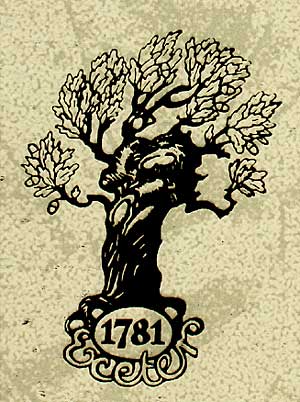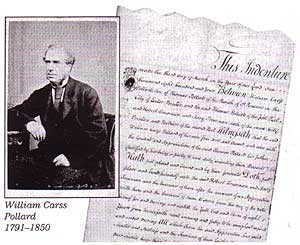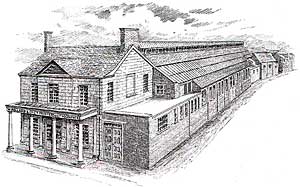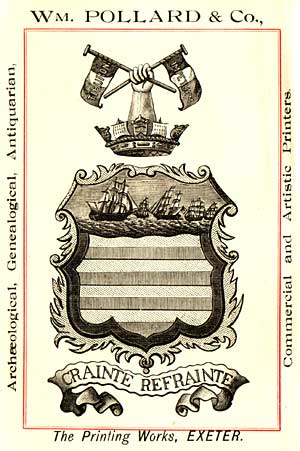
- Home
- Memories
- Scrapbook ▽
- Topics ▽
- People ▽
- Events
- Photos
- Site Map
- Timeline
Return to Service Industry
There have been Pollards living in and around North Street in Exeter since at least the 16th Century. A Military Survey of 1522 lists an Anthony Pollard along with another five Pollards in adjacent parishes. In 1766, a wine-cooper named Sampson took a lease 'formerly deriving from the heirs of Pollard'.
It is recorded that the first printing press in Exeter was installed in St Edmunds Church by John Williams, the rector, from 1554 to 1572, with a press supplied by Tavistock Abbey. Others followed, most notably Andrew Brice in the late 18th Century. The wool trade was lost with Napoleon's domination of Europe, but Exeter still retained much of its old wealth. Merchants were importing wine from Portugal and banking was established by the Baring's and others. This period saw many reforms that required printed material. Trewman's Exeter Flying Post first appeared in 1763 - Robert Trewman was a former apprentice of Brice. It was into this Exeter that Thomas Pollard was born in 1769.
The Pollard family records were lost in the bombing of 1942, but it is thought that a 12 year old Thomas started working for Robert Trewman. Thus the Pollard's family involvement with printing dates from 1781.
In 1789, Thomas Pollard married Elizabeth Carss in St Martin's Church. Their first son William Carss Pollard was born in 1791. Through this time, Thomas Pollard was employed by the Trewman's. In 1804, the young William was apprenticed to the Trewman's - his training wasn't complete until 1812. Sometime after, he set up his own printing business as 'W C Pollard of North Street' - the first entry in a street directory appears in 1822.
William Pollard was married to Ann Gould in 1817 at St Olave's Church, Fore Street. The young family took on Mary Carpenter as a domestic servant in 1818 - she would remain with the family for 60 years and become their first long term employee.
Expansion of the printing business followed the rapid expansion of new ideas across the nation. In 1830, the business printed the well received Jonathan Dymond's 'Essays on the Principles of Morality and the Private and Political Rights and Obligations of Mankind'.
The Pollard family itself expanded and by 1835, William and Ann had eight children. The cholera epidemic of 1832 did not pass the family by, with the death of the three year old George. In 1835, Ann Pollard herself, died when giving birth to Frederick, the last of William's family.
During this time the business produced printed material for commerce, entertainment and education. Letterpress was used for the majority of work with some limited lithography for illustrations and sheet music, and occasional, high quality colour printing. William printed and published his own works, principally in 1826, 'Devonshire Scenery: Directions for Visiting the Most Picturesque Spots on the Eastern and Southern Coast from Sidmouth to Plymouth', anticipating the importance of Exeter for the leisure visitor.
William Pollard died in 1850 at the age of 59 - his printing business was taken over by his eldest daughter, Elizabeth and eldest son, William. The young Henry was also employed as a printer and stationer.
The company continued to trade from 39/40 North Street, producing general jobbing work - posters, notices, timetables, and account and letter books. They also printed some privately commissioned family histories, complete with coats of arms and complex family trees. In 1870, William bought out his sister Elizabeth. It was in the 1870's that the company logo of a Pollarded Oak first appeared. William was an educated and scholarly man who was involved in the Devon and Exeter Institute. He became a City Councillor in 1874 for St Paul's. He opened a bookshop in the High Street and ventured into educational publishing. This was an area that was already well served by Wheaton's, and the Pollards educational business closed after a few years, probably taken over by their rivals.
William Pollard married Marianne Pinder, the daughter of local brewers, and had seven children. All his children were under 14 years old, when William died in 1885. His brother Frederick and sister Emma Langford were appointed as managers of the printer's by the family. In 1891 the North Street premises were rebuilt. Two of William's children, Herbert and Leonard joined the family business.
By 1900, changes were afoot - the family business was restructured as a company and share holdings issued to William's seven children.
It is recorded in 1910 that the company employed 61 - 25 compositors, 8 letterpress operators, 3 lithographers, 10 bindery and 2 warehouse staff. Many of these staff left for the Western Front during the First World War, including Leonard Pollard who joined the 4th Devons, rising to Colonel of the Regiment.
At the close of the war, in 1919, a new factory was built at the end of Bampfylde Street, just beyond Bampfylde House and stretching as far as the city wall. The first monotype machine was installed in the 1920's printing Council minutes and reports and other similar material. They were an early adopter of the telephone and were given the number, Exeter 3.
The Bampfylde works were vacated in 1931, and Pollard's opened the Bedford Garage on the site. They retained an interest in this business for only a few years. It was destroyed by bombing in May 1942.
The new Pollards printing works opened in Southernhay Gardens, on land that had previously been market gardens and orchards. The 1930's were a difficult time because of recession, but nevertheless, Pollard's produced some quality work among the bread and butter output.
On the outbreak of war, some key production was moved out of the Southernhay works, some equipment mothballed, and the Admiralty's Hydrograph Department moved in to occupy half the premises. The 4th May 1942 proved to be traumatic, as the factory was completely destroyed along with the Pollard's family home in Wonford Road. They lost their complete archives from the 19th Century.
The site was cleared and Nissan huts installed to house the remnants of equipment and staff. This state of affairs lasted until 1954 when the necessary planning permission was gained to rebuild the pre-war works. Michael Pollard, the son of Herbert was brought into the business after demob. Disagreements among the family led to Michael leaving and taking over W J Cornwell and Co in New Bridge Street. Pollard's had a difficult time through the 1950's resulting in a merger with Michael Pollard's, Cornwell and Co in 1958. Michael became the managing director of the joint company. During the 1960's and 70's company fortunes improved when they gained a foothold in the niche market of printing weighbridge tickets. New printing equipment was installed including some early electronic typesetting and a rotary press. Gradually, all the land on that side of Southernhay was developed for offices, and in 1991, Pollards vacated the site to a new factory at Sowton named Oak House.
In 1997 Michael Pollard resigned as chairman and was succeeded by Andrew Pollard. In 1998 the structure of the company was changed when it became a family - company partnership. Pollards are now a, flexible, modern printing company equipped with some of the latest printing equipment, to service the needs of many national businesses and Exeter's many businesses, both large and small. From a 13 year old boy in 1781 to £4.5 miilion business in the 21st Century, Pollard's truly are an Exeter firm.
Sources - The Story of William Pollard & Co Ltd loaned by John Smith. Pollard's website. © 2005 David Cornforth - not to be reproduced without permission
 Pollards logo.
Pollards logo.
 William Carss Pollard's indenture papers.
William Carss Pollard's indenture papers.
 The print works in Bampfylde Street became the Bedford Garage. The view is from roughly the position of Bampfylde House.
The print works in Bampfylde Street became the Bedford Garage. The view is from roughly the position of Bampfylde House. An advert for Pollards from 1894.
An advert for Pollards from 1894.
If you have a photo relating to William Pollard's, and would like to share it, please contact me on the email address at the foot of the page.
│ Top of Page │